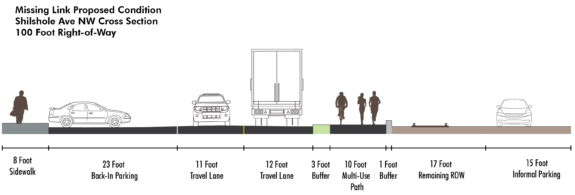Bill to exempt the Ballard Missing Link from state environmental laws will get Senate hearing Friday
 Example cross-section for the ready-to-build design on Shilshole Ave NW, from SDOT.
Example cross-section for the ready-to-build design on Shilshole Ave NW, from SDOT.The state legislature may step in and finally end the Ballard Missing Link's legal rats nest by exempting the city's trail plan from the State Environmental Policy Act (SEPA"). The House has already passed HB 1814, and now the Senate is scheduled to hold a hearing about it Friday morning.
Cascade sent out an action alert urging people to sign in pro" on HB 1814 via the legislature's committee sign in webpage between now and the 10:30 a.m. start of Friday's hearing in the Senate Committee on Environment, Energy and Technology.
If opponents had not abused the SEPA process, we would not be asking for this exemption," said Lee Lambert, Executive Director of Cascade Bicycle Club and Washington Bikes. The latest tie-up from the state's Shorelines Hearings Board has nothing to do with safe trail design or business access or anything regular people care about. It's about whether the city's modified trail design should be considered exempt from SEPA and whether the coalition group fighting the city's construction permit has legal standing. It's a rats nest of legal technicalities, as has been the case for decades. This is probably the most-studied mile or so of trail in the world, and the state legislature has the opportunity to step in and say, Enough is enough."
Though Lambert maintains that the city and Cascade have a good case to win their appeal of the most recent legal hurdle for the trail plan, exempting the trail from SEPA should also prevent trail opponents from finding yet another technicality to hold up construction of the overwhelmingly popular Shilshole route to complete the Burke-Gilman Trail.
HB 1814 has been written very narrowly so that it only pertains to trail projects on railroad right of way with a surface area under 10 acres located within a city of 500,000 or more. That means this bill would only pertain to rail-trail projects within the City of Seattle that are relatively short. The Burke-Gilman Missing Link in Ballard is the only current project that meets this definition.
The bill has been met with some concern from tribes in the state, who are understandably resistant to any weakening of SEPA. The state has a long history of building or permitting projects that have a negative impact on tribal lands, and SEPA is one of the most important tools to push back. In testimony to the House Local Government Committee, Lambert said they worked with the Muckleshoot Tribe to include language to require meaningful consultation" with any tribes that may be potentially affected and require the applicant and tribe to create an agreement.
All rail-banking projects are also required to go through an environmental assessment at the national level since the Surface Transportation Board oversees railroads, though the current Missing Link design would not displace the existing railroad tracks that the Meeker Southern Railroad (formerly the Ballard Terminal Railroad) sometimes uses to cosplay as a real railroad. Instead, the trail would run next to the railroad tracks but within the city-owned railroad right of way that includes area next to the tracks. However, if the tracks are officially abandoned in the future, then the city could possibly pursue a project to railbank the corridor and then widen the trail using the space currently occupied by the tracks. But that's a different project for another day.
It is difficult to think of other projects now or in the future that could be covered under this bill. They would need to be rail-trails less than a few miles or so. Seattle has done a pretty good job of creating rail-trails whenever possible, so there aren't many abandoned rail corridors sitting around town. It could potentially come up in the far future if there were ever a mass-abandonment of industrial lands in Seattle. Though in that case it seems likely projects could exceed the bill's 10-acre limit, and building a trail would be the least of the city's issues.